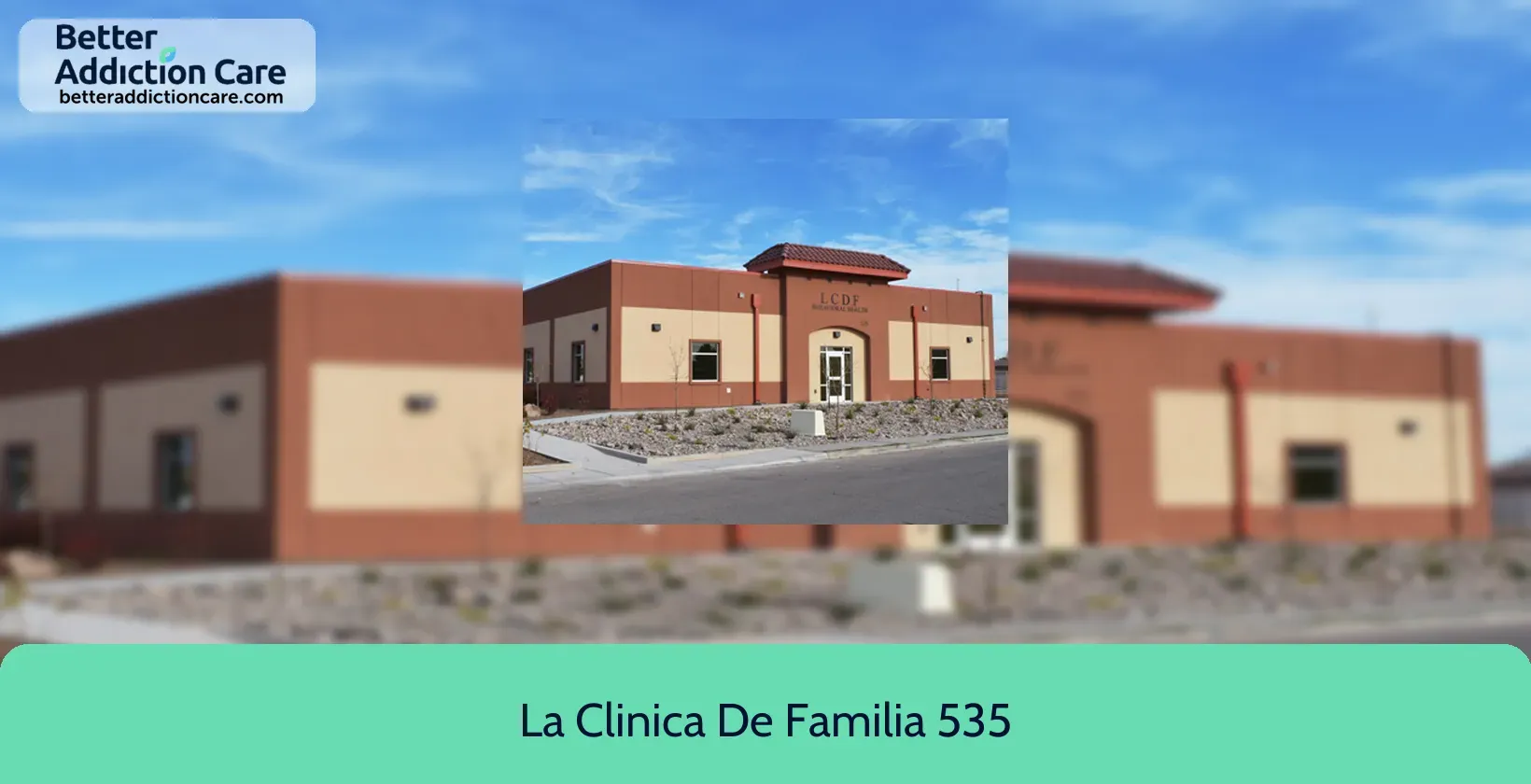La Clinica De Familia 535 South Miranda
Overview
La Clinica De Familia 535 South Miranda is a substance abuse treatment center for people seeking treatment near Dona Ana County. As part of their treatment modalities for recovery, La Clinica De Familia 535 South Miranda provides individual psychotherapy, couples/family therapy, and cognitive behavioral therapy during treatment. La Clinica De Familia 535 South Miranda is located in Las Cruces, New Mexico, accepting cash or self-payment for treatment.
La Clinica De Familia 535 South Miranda at a Glance
Payment Options
- Cash or self-payment
- Medicaid
- Medicare
- State-financed health insurance plan other than Medicaid
- Private health insurance
Assessments
- Screening for tobacco use
- Comprehensive mental health assessment
- Comprehensive substance use assessment
- Outreach to persons in the community
- Screening for mental disorders
Age Groups
- Seniors or older adults
- Young adults
- Children/adolescents
- Adults
- Seniors
Ancillary Services
- Assertive community treatment
- Case management service
- Chronic disease/illness management
- Diet and exercise counseling
- Education services
Highlights About La Clinica De Familia 535 South Miranda
7.00/10
With an overall rating of 7.00/10, this facility has following balanced range of services. Alcohol Rehabilitation: 8.00/10, Drug Rehab and Detox: 6.31/10, Insurance and Payments: 6.00/10, Treatment Options: 7.70/10.-
Alcohol Rehabilitation 8.00
-
Treatment Options 7.70
-
Drug Rehab and Detox 6.31
-
Insurance and Payments 6.00
Accreditations
State mental health department:
State mental health department accreditation refers to the process of evaluating and certifying the quality and standards of a state's mental health department, ensuring that it provides high-quality services and meets specific criteria for mental health care. The accreditation process is performed by a third-party organization and helps to improve the overall care and treatment of individuals with mental health conditions.
State department of health:

State Licenses, issued by government agencies, authorize rehabilitation organizations to legally operate within designated geographical areas. The specific licenses required for operation are typically determined by both the nature of the rehabilitation program provided by the facility and its physical location.
The Joint Commission:

The Joint Commission accreditation for addiction and behavioral health is a prestigious recognition signifying a facility's commitment to delivering high-quality care and safety for individuals dealing with substance abuse and mental health issues. It involves rigorous evaluations and assessments, ensuring patients receive evidence-based treatment and exceptional care. This accreditation demonstrates a facility's dedication to continuous improvement and ethical practices, building trust among patients and healthcare professionals seeking top-tier addiction and behavioral health services.
Federally Qualified Health Center:
Federally Qualified Health Center (FQHC) accreditation is a process of evaluation and recognition by the federal government for community health centers that provide comprehensive and accessible healthcare services to underserved populations. FQHC accreditation is essential for centers to receive federal funding and to ensure that they meet standards for quality, patient-centered care.
Treatment At La Clinica De Familia 535 South Miranda
Treatment Conditions
- Alcoholism
- Mental health treatment
- Substance use treatment
- Co-occurring Disorders
Care Levels
- Outpatient
- Regular outpatient treatment
- Aftercare
Treatment Modalities
- Individual psychotherapy
- Couples/family therapy
- Cognitive behavioral therapy
- Integrated Mental and Substance Use Disorder treatment
- Telemedicine/telehealth therapy
Ancillary Services
Languages
- Sign language services for the deaf and hard of hearing
- Spanish
Additional Services
- Pharmacotherapies administered during treatment
- Mentoring/peer support
- Drug or alcohol urine screening
Special Programs
- Clients with co-occurring mental and substance use disorders
- Veterans
- Active duty military
- Members of military families
- Criminal justice (other than DUI/DWI)/Forensic clients
Common Questions About La Clinica De Familia 535 South Miranda
Contact Information
Read our Most Recent Article About Drug Addiction
DISCLAIMER: The facility name, logo and brand are the property and registered trademarks of La Clinica De Familia 535 South Miranda, and are being used for identification and informational purposes only. Use of these names, logos and brands shall not imply endorsement. BetterAddictionCare.com is not affiliated with or sponsored by La Clinica De Familia 535 South Miranda.









